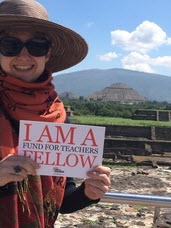The Wall Street Journal recently shared an article titled “It’s Never Too Late,” referring to how the “multiple cognitive peaks throughout our lives, and the talents and passions that we have to offer can emerge across a range of personal circumstances.” Such is the case for Larry Shortell, special education teacher at Explorations Charter School in Winstead, CT.
 After serving in the US Navy, Larry became a SCUBA diving instructor, then earned a CDA Certification and worked in a daycare while earning his B.S. in Special Education at the University of Southern Florida. Next, he completed an MS in Education from Cambridge College and earned a Teaching English as a Foreign Language certificate and taught in Laos. Teaching has since taken him to classrooms in Florida, Hawaii, Alaska and, now, to the island of Bonaire as a Fund for Teachers Fellow.
After serving in the US Navy, Larry became a SCUBA diving instructor, then earned a CDA Certification and worked in a daycare while earning his B.S. in Special Education at the University of Southern Florida. Next, he completed an MS in Education from Cambridge College and earned a Teaching English as a Foreign Language certificate and taught in Laos. Teaching has since taken him to classrooms in Florida, Hawaii, Alaska and, now, to the island of Bonaire as a Fund for Teachers Fellow.
Under the guidance of a university professor who specializes in ichthyology and the marine environment, Larry leaves next week to conduct in-depth, underwater research documenting the cruise industry’s impact on climate change. He will then use his findings to create science curriculum for special education and Adventure Education students, as well as members of the school’s Exotic, Endangered, or Extinct Animals Club and Environmental Concerns Club.
 “I am a high school special education teacher (grades 9-12) in a school whose mission is to cultivates a positive attitude toward life-long learning in an experiential, non-traditional setting,” said Larry. “This fellowship will help me create multi-sensory, high interest learning for special and regular education students, as well as a mixture of students in the clubs that I lead. This approach should level the playing field for the special education students while simultaneously engaging their more advanced peers.”
“I am a high school special education teacher (grades 9-12) in a school whose mission is to cultivates a positive attitude toward life-long learning in an experiential, non-traditional setting,” said Larry. “This fellowship will help me create multi-sensory, high interest learning for special and regular education students, as well as a mixture of students in the clubs that I lead. This approach should level the playing field for the special education students while simultaneously engaging their more advanced peers.”
Just as the article suggests, Larry designed his fellowship to expand upon his 20-year career as a special education teacher and also his passion for underwater conservation. Four years ago, the cruise ship industry descended upon Bonaire, just as the Council of International Educational Exchange’s research station closed. Larry plans to generate data that bridge resulting gaps in Bonaire’s sustainability model and establish protocols for the other Caribbean island’s reef systems.
Back at school, his impacts are geared toward modeling for students an understanding of education and life-long learning that involves the synthesis of experiences and knowledge.
“I want my students to understand that everything we learn and do in life can be used to construct a world view that incorporates balance and wonder,” said Larry. “I want them to see that effort and education can lead to adventures unimagined when we begin on a path of exploration.”

 [minti_divider style=”1″ icon=”” margin=”20px 0px 20px 0px”]
[minti_divider style=”1″ icon=”” margin=”20px 0px 20px 0px”]
Larry is the author of Summers Off: The Worldwide Adventures of a School Teacher and Summers On: The Global Exploration of an Educator. You can also enjoy his nature photography here.


 classes 30 hours per week, toured local schools and important cultural sites, met local teachers and constantly interacted with people in Spanish.
classes 30 hours per week, toured local schools and important cultural sites, met local teachers and constantly interacted with people in Spanish. Lana is a speech-language pathologist for the
Lana is a speech-language pathologist for the